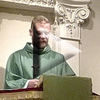The following is a paper I wrote for a class I took in my final semester in seminary. Someone on Facebook recently asked me if they could read it, and I'm more than happy to provide.
The original date of this is May 23, 2014. The date of this entry, however, would be my official publication date.
Lutheran Reclamation of the Sacrament of Confession and AbsolutionSpirit in the Church ST-2378
Cary Bass-Deschenes
May 23, 2014
Even though the rite of Confession and Forgiveness is available in the Lutheran Church both individually and corporately, most Lutherans are not even aware of it, and even fewer consider it a sacrament. However, a Lutheran understanding of confession and absolution as a sacrament goes all the way back to Martin Luther, and is delineated as such within the Book of Concord, the collection of all of the 16th century basic documents that provide a Lutheran understanding of theology. Although private confession and absolution was subsumed into a rarely used rite during the Age of Enlightenment, it has nevertheless remained a staple means of grace in the Lutheran church, and re-emerged in the Twentieth Century during a period of renewed excitement in unity and liturgy that sought to unify Lutheran rights with a restoration of what was uniquely Lutheran in the 16th century and a keen eye on how Martin Luther and the early Lutheran fathers worshiped and taught. This essay will look into that history as well as the developed Lutheran understanding of sacrament, provide some explanation of how the rite of Confession and Forgiveness is performed in the world today, and offer insight as to how meaningful the rite is and how it can be, as a sacrament, a way of bringing us into closer communion with other Christian denominations.


